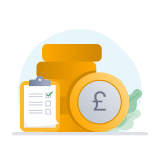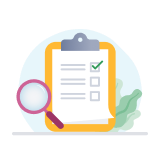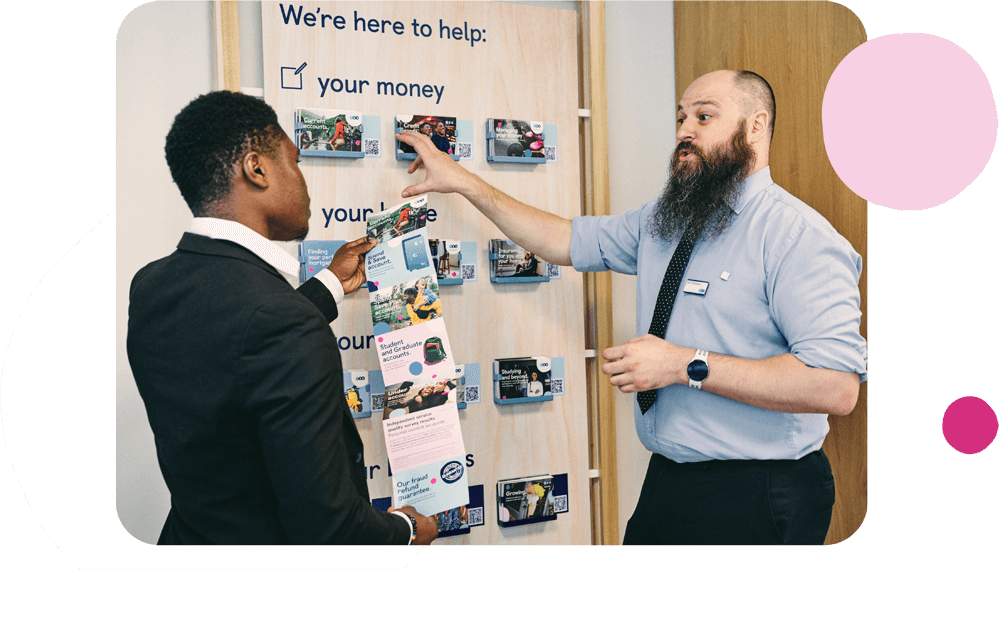Together we can end domestic abuse.

Financial Planning for Retirement: What You Need to Know
Whether you’re years away from retirement or it’s just around the corner, it’s never too late (or early!) to take control of your financial future.
There’s no one-size-fits-all method for successful later life planning. Everyone’s finances and goals are unique and different. All you need to do is find the planning method that works for you.
At TSB, we’re here to help you do just that. We provide practical advice, easy-to-use tools, and clear information to support your decisions and help you make the most of your retirement. Read our blog for retirement planning guide to learn more.

Why does planning for retirement matter?
Having a solid, flexible retirement plan can help you enjoy the lifestyle you want, stay prepared for any unexpected costs, and even leave something behind for your loved ones.
Planning ahead means you can enjoy the rewards of everything you’ve worked so hard for and live life on your terms. It could help you grow your savings over time and get a better idea of how much cash you’ll need to live comfortably.
It’s worth thinking beyond just your pension to get the most out of your planning. A smart plan might rely on a mix of income, including the State Pension, workplace or private pensions, savings, ISAs and even investments. A little bit of planning now can pay off in the future and will have you on your way to enjoying your retirement with more savings and less stress.
How to plan your finances for retirement
It s a good idea to break everything down into a few simple steps so you can feel more confident and in control of your money. Here are some financial planning tips to follow:
Step 1: Assess your current financial situation
Start by getting a good picture of where you are right now. Take a look at your savings, any pension pots you have, and any outstanding lending too. Knowing exactly where you stand today makes it easier to plan for the future.
Step 2: Estimate your retirement income needs
Ask yourself what you’d like your life to look like in retirement. What will you need to cover your everyday costs? Will you want to travel, enjoy hobbies, or support your family? Having a rough idea of what you might spend can help you set a clear goal to work towards and help you determine a budget.
Step 3: Determine how much to save
Now you’ve mapped out some goals, it will be a good idea to figure out what you’ll need to budget and save to make them a reality. Write down your income streams and assess your savings to work out what to set aside regularly. Starting sooner gives your money more time to build up over the years.
Step 4: Explore investment options
You don’t need to be nearing retirement to start thinking about investing. Whether you re planning ahead or already enjoying life after work, options like Fixed Rate Cash ISAs or Lifetime ISAs can help your savings grow over time.
Step 5: Create a flexible retirement plan
Keep your plan flexible. Review your plan regularly and tweak things as your income, savings, investment growth, and goals change. Don’t forget to think about protection too, such as life insurance. You can learn more about this in our Life Insurance Guide.

Types of retirement savings accounts
Financial planning for retirement is all about exploring the different ways you can save and grow your money for the future. Using a few different savings options can help you spread things out and make the most of the benefits each one offers. Here’s a simple rundown of the main types of accounts that can play a part in a strong retirement finance plan.
ISAs
ISAs are a really popular tool that can help you to save and invest for the future. Each tax year, you currently have a £20,000 tax-free ISA allowance that can be spread across various types of ISAs, including:
- Instant Access Cash ISA Saver: Earn interest tax-free and with instant access to your money.
- Save Well Limited Access ISA: If you’re not planning on making withdrawals, the Save Well Limited Access ISA account could be a good option. Plus, anything you save will count towards your tax-free ISA allowance. If you do need to take money out, your interest will change for that month.
- Fixed Rate Cash ISAs: With a Fixed Rate Cash ISA you can earn tax-free interest on a lump sum when you lock your money away for 18 months, 2 years, or 3 years and enjoy fixed rates for your chosen term.
Junior Cash ISAs
As part of your retirement planning, you may decide you want to start saving for your grandchildren or younger family members. Junior Cash ISAs are a fantastic way to do this as you can deposit up to £9,000 tax-free each year, without impacting your own £20,000 ISA allowance. However, you can only open a Junior Cash ISA if you have parental responsibility for the child.
Find out everything you need to know about ISAs with our handy ISA Guide.
Correct as of 04/09/2025
Pensions
Pensions are one of the most important ways to save for retirement, and there are three main types of pensions for you to know about:
- State Pensions: A state pension is a regular payment from the government based on your National Insurance contributions. It gives you a basic income in retirement, but it’s unlikely to cover everything you might need on its own
- Workplace Pensions: These are set up through your employer, and both you and your employer usually pay into them. It’s an easy way to build your pension pot over time, with contributions coming straight out of your salary.
- Personal Pensions: These are pensions you set up yourself, which can be really useful if you’re self-employed or just want to add a bit extra to what you’ve already got. You decide how much to put in and how you want the money to be invested.
From 2028, the earliest age you’ll be able to access a personal pension will change from 55 to 57. So if you’re planning to retire early, it’s worth factoring this into your plans and thinking about other ways to bridge the gap if you need to.

Why it's never too early to start saving
The sooner you start saving for your retirement, the more benefit you’re going to get from compound interest. Starting early really gives you the best chance of building a healthy nest egg for the future.
Retirement planning at every age
- In your 20s: Your 20s are the perfect time to get into the habit of saving. Signing up for a workplace pension means your employer will often add to your pot too, giving your savings a helpful boost.
- In your 30s and 40s: By the time you’re in your 30s or 40s, things might start to change. Maybe you’re buying a home or thinking about starting a family. Hopefully your salary has grown with your experience, giving you a bit more to work with.
At this point you could take another look at your pension and see if you can put in a bit more whenever you get a pay rise. You can also look to make the most of your ISA allowance and consider investing. And if you’re planning on a family, Junior ISAs are a smart way to get a head start on their future savings. Check out our full Guide to Saving for Children.
- In your 50s and 60s: If you’re feeling like you haven’t saved as much as you wanted, don’t worry. There’s more than enough time to catch up.
Take a look at your pension pots and see if you can contribute more. It’s also a great time to start thinking about smart, tax-efficient ways to protect what you’ve already saved, like using ISAs or getting your estate plans in order. The main goal here is to help you relax and live your best retirement life without any worries.

Plan your personal finances for retirement today
Getting your finances sorted for retirement is one of the best things you can do to feel more secure about the future. It’s all about feeling more in control, knowing what to expect, and giving yourself the freedom to enjoy life after work.
And you don’t have to figure it all out by yourself. At TSB, we are here to help with handy tools, guidance, and personalised advice to get you on the right track, no matter how near or far away retirement is for you.
You can check in on your accounts and keep tabs on your progress anytime with the TSB Mobile Banking App. And if you need a bit of support along the way, our Help and Support team is always just a click or visit away.
Account Opening is subject to our assessment of your circumstances. You must be 18 or over and a UK resident to apply. Interest paid monthly.
You need to be 16+ and UK resident to open most of our savings accounts with the exception of Savings Pots and TSB ISAs. You need to be 18+ to apply for an ISA.
Speak to a Money Confidence Expert
Whether you bank with us or not, we’re here to make banking better for everybody. Our goal is to help you get more from your money. And chatting to us is completely free.

